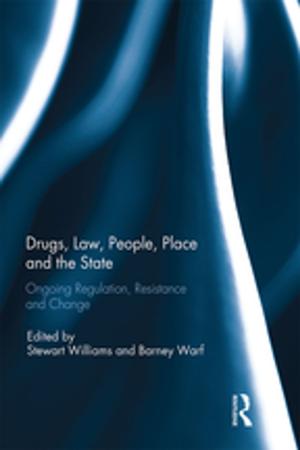Lie Detection and the Law
Torture, Technology and Truth
Nonfiction, Reference & Language, Law, Criminal Procedure, Social & Cultural Studies, Social Science, Crimes & Criminals, Criminology, Science & Nature, Science, Biological Sciences| Author: | Andrew Balmer | ISBN: | 9781317518402 |
| Publisher: | Taylor and Francis | Publication: | May 23, 2018 |
| Imprint: | Routledge | Language: | English |
| Author: | Andrew Balmer |
| ISBN: | 9781317518402 |
| Publisher: | Taylor and Francis |
| Publication: | May 23, 2018 |
| Imprint: | Routledge |
| Language: | English |
This book develops a sociological account of lie detection practices and uses this to think about lying more generally. Bringing together insights from sociology, social history, socio-legal studies and science and technology studies (STS), it explores how torture and technology have been used to try to discern the truth. It examines a variety of socio-legal practices, including trial by ordeal in Europe, the American criminal jury trial, police interrogations using the polygraph machine, and the post-conviction management of sex offenders in the USA and the UK. Moving across these different contexts, it articulates how uncertainties in the use of lie detection technologies are managed, and the complex roles they play in legal spaces. Alongside this story, the book surveys some of the different ways in which lying is understood in philosophy, law and social order. Lie Detection and the Law will be of interest to STS researchers, socio-legal scholars, criminologists and sociologists, as well as others working at the intersections of law and science.
This book develops a sociological account of lie detection practices and uses this to think about lying more generally. Bringing together insights from sociology, social history, socio-legal studies and science and technology studies (STS), it explores how torture and technology have been used to try to discern the truth. It examines a variety of socio-legal practices, including trial by ordeal in Europe, the American criminal jury trial, police interrogations using the polygraph machine, and the post-conviction management of sex offenders in the USA and the UK. Moving across these different contexts, it articulates how uncertainties in the use of lie detection technologies are managed, and the complex roles they play in legal spaces. Alongside this story, the book surveys some of the different ways in which lying is understood in philosophy, law and social order. Lie Detection and the Law will be of interest to STS researchers, socio-legal scholars, criminologists and sociologists, as well as others working at the intersections of law and science.















